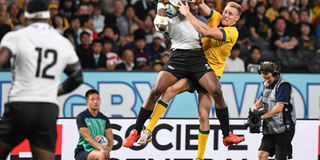World Cup tackle policy under fire after Australia's Hodge escapes action

Fiji's wing Semi Radradra (left) and Australia's wing Reece Hodge compete for the ball during their Japan 2019 Rugby World Cup Pool D match at the Sapporo Dome in Sapporo on September 21, 2019. PHOTO | WILLIAM WEST |
What you need to know:
- Concussion protocols mean he is now set to miss Fiji's match against Uruguay in Kamaishi on Wednesday.
- World Rugby consultant Tucker took to Twitter to explain his surprise at the lack of on-field action against Hodge, explaining that as there was head contact and his shoulder was high, it should have been an automatic red under current protocols.
SAPPORO, JAPAN
World Rugby's crackdown on dangerous tackles was called into question on Saturday after just two games of the Rugby World Cup by one of the men who drew up the new regulations.
South African sports scientist Ross Tucker, who helped write the "pathway" check list to help referees decide how to sanction high shots, made his comments after Australia wing Reece Hodge avoided a red card against Fiji.
Hodge prevented Peceli Yato from scoring what would have been a try in the 26th minute of the Wallabies' tournament-opening 39-21 win at the Sapporo Dome on Saturday by blocking the flanker with a shoulder-led, no-arms challenge to the head.
To make matters worse for Fiji, Yato - who had scored the opening try and been in brilliant form until he went off - then failed a head injury assessment (HIA) after being hurt in a challenge that could also have been punished by a penalty try.
STRAIGHT RED
Concussion protocols mean he is now set to miss Fiji's match against Uruguay in Kamaishi on Wednesday.
World Rugby consultant Tucker took to Twitter to explain his surprise at the lack of on-field action against Hodge, explaining that as there was head contact and his shoulder was high, it should have been an automatic red under current protocols.
And in a reference to a challenge by Japan's James Moore on Russia Vasily Dorofeev in the hosts' opening 30-10 win in Tokyo on Friday, Tucker added: "Two pathway 2s so far in the tournament, two ball carrier HIAs. Not good."
Fiji captain Dominiko Waqaniburotu said he asked New Zealand referee Ben O'Keeffe to refer the incident to English television match official Rowan Kitt, but the tackle was deemed legitimate.
As recently as Monday, World Cup referees chief Alain Rolland warned competing teams that high tackles would be punished severely, even if that meant the outcome of matches being determined by red cards.
But the Hodge incident raised suspicions that it was another example of key decision going against a Tier Two nation such as Fiji.
Hodge could still be cited for the challenge but Fiji coach John McKee refused to criticise either the Australia player or the match officials.
"I haven't seen footage of the incident yet, but maybe some people will look at it. We haven't spoken to the TMO yet," McKee said.
"The referee has a tough job out there. There's a lot going on.
"We maybe didn't get the rub of the green, but we have no complaints about the referee. We take a lot out of that game and we are still in this tournament."
Waqaniburotu added the tackle was missed by O'Keeffe.
"He said he didn't see anything so it will be referred to the TMO. We will just have to see what happens," he explained.
Australia coach Michael Cheika also said he did not see the incident but added "the collision was a massive one and a try-saver".
Cheika was more concerned by what he said was the referee and touch judges' focus "from the first minute" on Australia flanker David Pocock.
"I heard his name mentioned between them on the commentary at last half-a-dozen times in their own chat, when he hadn't even been involved in a ruck.
"I'm not sure what the focus is on him."





